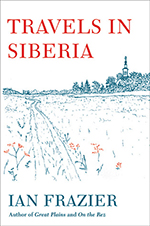5 November 2016
Travels in Siberia, by Ian Frazier
Posted by Callan Bentley
 I’ve let my subscription to the New Yorker lapse, but before I did, I was pleased to read each week its diverse suite of authors on a diverse suite of topics. This has been a source of surprising delight on several occasions, and has allowed me to discover not only topics I never thought to be interested in, but also authorial voices I never would have otherwise read. I’m reminded of how, two decades ago, reading John McPhee’s geology books with sesquipedalian glee led me down the warren of rabbit holes of his other books – oranges, blimps, birchbark canoes, how UPS ships lobsters – with delight and wonder. The fact that many of these books started off as pieces for the New Yorker is not a coincidence. Anyhow, Ian Frazier is another staff writer for the magazine, and I enjoyed the pieces he published in the magazine about traveling in Siberia. Recently, these were published along with much more in a hefty book simply titled, Travels in Siberia. I recently listened to the audiobook version of it, read by the author. If you’re into travel literature, you might like it. It’s cut from the same cloth as many of Paul Theroux’s books in that genre. The difference, and I think it’s a notable one, is that Frazier is a Russophile, and has been for decades. He’s taken many trips to different parts of Siberia, by multiple means of transport, with different traveling companions, in different seasons. That’s one of the strengths of this book – each trip is its own thing, though some are relatively brief and others are multiweek expeditions. There’s a diversity of flavors that results. It stands in contrast to something like Theroux’s book about taking the train across Asia (including Siberia), The Great Railway Bazaar. That said, most of the book is centered on a single trip, a big one, by car, east to west across Siberia. That’s the trunk, with branches coming off to detail earlier forays and later jaunts. There are discussions of Russian literature, culture, and history, but most of Travels in Siberia is about personal experience, detailing daily routines and key anecdotes, moments of misery and sublime insight. It’s a traditional piece of travel literature on that mark, and I wouldn’t consider it exemplary in any way. It’s well written, as you’d expect, and I enjoyed listening to it, but I doubt I’d ever go back to it for a second read, nor am I inspired to visit Siberia on account of reading it. Frazier’s driving Russophilia does not appear to be contagious.
I’ve let my subscription to the New Yorker lapse, but before I did, I was pleased to read each week its diverse suite of authors on a diverse suite of topics. This has been a source of surprising delight on several occasions, and has allowed me to discover not only topics I never thought to be interested in, but also authorial voices I never would have otherwise read. I’m reminded of how, two decades ago, reading John McPhee’s geology books with sesquipedalian glee led me down the warren of rabbit holes of his other books – oranges, blimps, birchbark canoes, how UPS ships lobsters – with delight and wonder. The fact that many of these books started off as pieces for the New Yorker is not a coincidence. Anyhow, Ian Frazier is another staff writer for the magazine, and I enjoyed the pieces he published in the magazine about traveling in Siberia. Recently, these were published along with much more in a hefty book simply titled, Travels in Siberia. I recently listened to the audiobook version of it, read by the author. If you’re into travel literature, you might like it. It’s cut from the same cloth as many of Paul Theroux’s books in that genre. The difference, and I think it’s a notable one, is that Frazier is a Russophile, and has been for decades. He’s taken many trips to different parts of Siberia, by multiple means of transport, with different traveling companions, in different seasons. That’s one of the strengths of this book – each trip is its own thing, though some are relatively brief and others are multiweek expeditions. There’s a diversity of flavors that results. It stands in contrast to something like Theroux’s book about taking the train across Asia (including Siberia), The Great Railway Bazaar. That said, most of the book is centered on a single trip, a big one, by car, east to west across Siberia. That’s the trunk, with branches coming off to detail earlier forays and later jaunts. There are discussions of Russian literature, culture, and history, but most of Travels in Siberia is about personal experience, detailing daily routines and key anecdotes, moments of misery and sublime insight. It’s a traditional piece of travel literature on that mark, and I wouldn’t consider it exemplary in any way. It’s well written, as you’d expect, and I enjoyed listening to it, but I doubt I’d ever go back to it for a second read, nor am I inspired to visit Siberia on account of reading it. Frazier’s driving Russophilia does not appear to be contagious.


 Callan Bentley is Associate Professor of Geology at Piedmont Virginia Community College in Charlottesville, Virginia. He is a Fellow of the Geological Society of America. For his work on this blog, the National Association of Geoscience Teachers recognized him with the James Shea Award. He has also won the Outstanding Faculty Award from the State Council on Higher Education in Virginia, and the Biggs Award for Excellence in Geoscience Teaching from the Geoscience Education Division of the Geological Society of America. In previous years, Callan served as a contributing editor at EARTH magazine, President of the Geological Society of Washington and President the Geo2YC division of NAGT.
Callan Bentley is Associate Professor of Geology at Piedmont Virginia Community College in Charlottesville, Virginia. He is a Fellow of the Geological Society of America. For his work on this blog, the National Association of Geoscience Teachers recognized him with the James Shea Award. He has also won the Outstanding Faculty Award from the State Council on Higher Education in Virginia, and the Biggs Award for Excellence in Geoscience Teaching from the Geoscience Education Division of the Geological Society of America. In previous years, Callan served as a contributing editor at EARTH magazine, President of the Geological Society of Washington and President the Geo2YC division of NAGT.